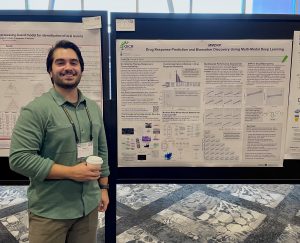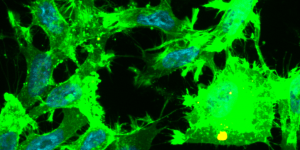Receive the latest news, event invites, funding opportunities and more from the Ontario Institute for Cancer Research.
The Computational Biology Program is the driving force behind Ontario research and data studies in cancer. The program’s team uses powerful computers and software tools to collect, manage and study data from many sources. The findings we uncover from the data are shared with other cancer research groups to speed up the discovery of new information about cancer.
Our goal is to learn more about cancer and create better treatments by using computers to help answer questions and solve problems. The scale and range of cancer research projects have grown in size and scope. This has led to the creation of large amounts of data. It takes a lot of effort to organize, study and view this data. For these reasons, computers have become vital for researchers to search and explore data quickly.
We use computers, math, and statistics to study large amounts of data and make sense of it. We also share our data with other cancer research groups, teach other researchers to use our software and tools, and promote dialogue with the broader cancer research community. By doing all this, we speed up the process of creating new findings in cancer research and empower the next generation of researchers so they can create better treatments.

Program Manager
Dr. Robin Haw
robin.haw@oicr.on.ca
Telephone: 647-260-7985
The Computational Biology Program is the scientific engine of research and analytics at OICR. The program’s investigators lead local and international cancer genomics research studies and programs. In many cases, the program’s teams develop new algorithms, software, visualization tools and other necessary components to interrogate and interpret the large and complex datasets. Our resources and expertise are shared with the Ontario and the international cancer research community, with the goal of supporting the acceleration of cancer research.
Our mission is to advance the knowledge and treatment of cancer through computational biology.
Our research objectives are to:
The Computational Biology Program is open to and encourages research collaborations. Please contact any of the Principal Investigators or review our Collaborative Research Resources Directory for more information.
Principal investigators and senior scientists in the Computational Biology Program have a broad set of research interests and expertise, ranging from open research and reproducibility, to algorithm development for long-read sequences, pipelines for sequencing and analysis, biomarker discovery, viral detection, and population-based genomics approaches to cancer, as well as pathway and network analysis. While our research activities and expertise focus on cancer, they also have broader application in genomic research.
The Computational Biology Program is involved in a wide variety of research projects. We play both leadership, and collaborative, scientific roles in many cancer research projects, with a strong mandate to output to the scientific community open-source, open-access data, tools and resources.
Projects under the Computational Biology Program include:
(CPC-GENE), a project aimed at understanding the prostate cancer genome to better predict treatment failure for intermediate risk prostate cancers.
A pan-Canada research project to rapidly develop novel diagnostic markers for early prostate cancer.
















